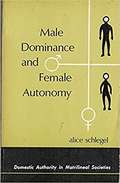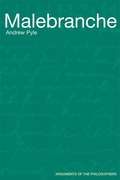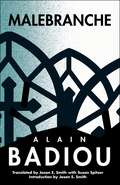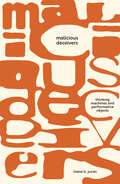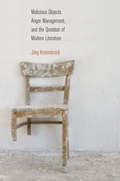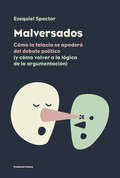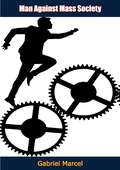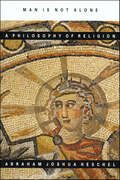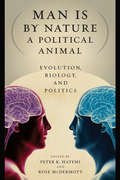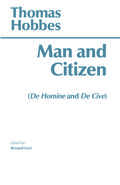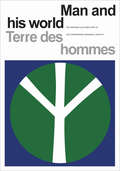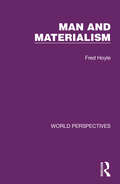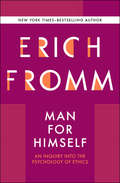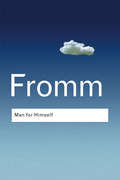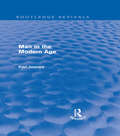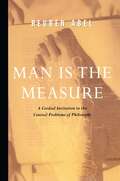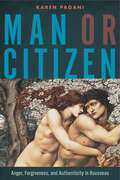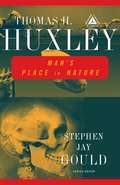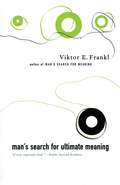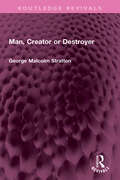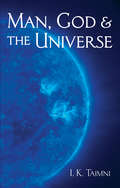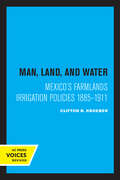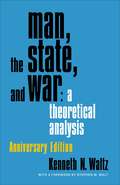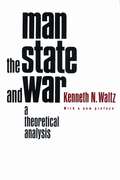- Table View
- List View
Male Dominance And Female Autonomy: Domestic Authority In Matrilineal Societies (Comparative Studies)
by Alice Schlegel Raoul NarollMale Dominance and Female Autonomy: Domestic Authority in Matrilineal Societies
Malebranche (Arguments of the Philosophers)
by Andrew PyleNicolas Malebranche (1638-1715) is one of the most important philosophers of the seventeenth century after Descartes. A pioneer of rationalism, he was one of the first to champion and to further Cartesian ideas.Andrew Pyle places Malebranche's work in the context of Descartes and other philosophers, and also in its relation to ideas about faith and reason. He examines the entirety of Malebranche's writings, including the famous The Search After Truth, which was admired and criticized by both Leibniz and Locke. Pyle presents an integrated account of Malebranche's central theses, occasionalism and 'vision in God', before exploring and assessing Malebranche's contribution to debates on physics and biology, and his views on the soul, self-knowledge, grace and the freedom of the will.This penetrating and wide-ranging study will be of interest to not only philosophers, but also to historians of science and philosophy, theologians, and students of the Enlightenment or seventeenth century thought.
Malebranche: Theological Figure, Being 2 (The Seminars of Alain Badiou)
by Alain BadiouAlain Badiou is perhaps the world’s most significant living philosopher. In his annual seminars on major topics and pivotal figures, Badiou developed vital aspects of his thinking on a range of subjects that he would go on to explore in his influential works. In this seminar, Badiou offers a tour de force encounter with a lesser-known seventeenth-century philosopher and theologian, Nicolas Malebranche, a contemporary and peer of Spinoza and Leibniz.The seminar is at once a record of Badiou’s thought at a key moment in the years before the publication of his most important work, Being and Event, and a lively interrogation of Malebranche’s key text, the Treatise on Nature and Grace. Badiou develops a rigorous yet novel analysis of Malebranche’s theory of grace, retracing his claims regarding the nature of creation and the relation between God and world and between God and Jesus. Through Malebranche, Badiou develops a radical concept of truth and the subject. This book renders a seemingly obscure post-Cartesian philosopher fascinating and alive, restoring him to the philosophical canon. It occupies a pivotal place in Badiou’s reflections on the nature of being that demonstrates the crucial role of theology in his thinking.
Malicious Deceivers: Thinking Machines and Performative Objects (Sensing Media: Aesthetics, Philosophy, and Cultures of Media)
by Ioana B. JucanIn Malicious Deceivers, Ioana B. Jucan traces a genealogy of post-truth intimately tied to globalizing modernity and connects the production of repeatable fakeness with capitalism and Cartesian metaphysics. Through case studies that cross times and geographies, the book unpacks the notion of fakeness through the related logics of dissimulation (deception) and simulation (performativity) as seen with software/AI, television, plastics, and the internet. Specifically, Jucan shows how these (dis)simulation machines and performative objects construct impoverished pictures of the world, ensuring a repeatable sameness through processes of hollowing out embodied histories and lived experience. Through both its methodology and its subjects-objects of study, the book further seeks ways to counter the abstracting mode of thinking and the processes of voiding performed by the twinning of Cartesian metaphysics and global capitalism. Enacting a model of creative scholarship rooted in the tradition of writing as performance, Jucan, a multimedia performance-maker and theater director, uses the embodied "I" as a framing and situating device for the book and its sites of investigation. In this way, she aims to counter the Cartesian voiding of the thinking "I" and to enact a different kind of relationship between self and world from the one posited by Descartes and replayed in much Western philosophical and — more broadly — academic writing: a relationship of separation that situates the "I" on a pedestal of abstraction that voids it of its embodied histories and fails to account for its positionality within a socio-historical context and the operations of power that define it.
Malicious Objects, Anger Management, and the Question of Modern Literature
by Jörg KreienbrockWhy do humans get angry with objects? Why is it that a malfunctioning computer, a broken tool, or a fallen glass causes an outbreak of fury? How is it possible to speak of an inanimate object’s recalcitrance, obstinacy, or even malice? When things assume a will of their own and seem to act out against human desires and wishes rather than disappear into automatic, unconscious functionality, the breakdown is experienced not as something neutral but affectively—as rage or as outbursts of laughter. Such emotions are always psychosocial: public, rhetorically performed, and therefore irreducible to a “private” feeling.By investigating the minutest details of life among dysfunctional household items through the discourses of philosophy and science, as well as in literary works by Laurence Sterne, Jean Paul, Friedrich Theodor Vischer, and Heimito von Doderer, Kreienbrock reconsiders the modern bourgeois poetics that render things the way we know and suffer them.
Malversados: Cómo la falacia se apoderó del debate político (y cómo volver a la lógica de la argumentación)
by Ezequiel SpectorUn libro que pone en evidencia cuáles son las quince trampas argumentativas más habituales en los debates políticos y nos da las herramientas para recuperar la lógica de la argumentación racional, base de la democracia deliberativa. La forma de debate más habitual en los medios -con réplica en las redes sociales- consagra "ganador" a quien da el mejor golpe de efecto. En el mismo gesto en que nos acostumbramos a dirimir en términos de aclamación o condena, dejamos de prestar atención a cualquier tipo de argumento y nos contentamos con subir o bajar el pulgar. Cuando el contenido de una discusión íntima o pública, privada o mediática, se plaga de trampas argumentativas -en términos técnicos, falacias lógicas-, la verdad es la primera víctima. La pérdida de la capacidad de discutir ideas, sopesar argumentos y confrontar propuestas daña seriamente la cultura política de una sociedad y deteriora la democracia. En este libro, Ezequiel Spector pone en evidencia de modo práctico, concreto y lúcido las quince falacias más habituales en los debates políticos y presenta una guía útil para sortearlas y volver a discutir lógica, llana y, sobre todo, limpiamente. Porque sin honestidad intelectual no hay debate posible y sin debate no hay esfera pública, Malversados puede considerarse una oportuna herramienta de construcción de ciudadanía.
Man Against Mass Society
by Gabriel MarcelMAN AGAINST MASS SOCIETY focuses on the “mass man,” who has been dehumanized in a society which reduces the person to the functions he performs, in which he has no distinctive worth and cannot claim to be unique and irreplaceable, and whose tragic result is that he may accept this abstract view of himself as final.
Man Is Not Alone: A Philosophy of Religion
by Abraham J. HeschelMan Is Not Alone is a profound, beautifully written examination of the ingredients of piety: how man senses God's presence, explores it, accepts it, and builds life upon it. Abraham Joshua Heschel's philosophy of religion is not a philosophy of doctrine or the interpretation of a dogma. He erects his carefully built structure of thought upon foundations which are universally valid but almost generally ignored. It was Man Is Not Alone which led Reinhold Niebuhr accurately to predict that Heschel would "become a commanding and authoritative voice not only in the Jewish community but in the religious life of America." With its companion volume, God in Search of Man, it is revered as a classic of modern theology.
Man Is by Nature a Political Animal: Evolution, Biology, and Politics
by Rose Mcdermott Peter K. HatemiIn Man Is by Nature a Political Animal, Peter K. Hatemi and Rose McDermott bring together a diverse group of contributors to examine the ways in which evolutionary theory and biological research are increasingly informing analyses of political behavior. Focusing on the theoretical, methodological, and empirical frameworks of a variety of biological approaches to political attitudes and preferences, the authors consider a wide range of topics, including the comparative basis of political behavior, the utility of formal modeling informed by evolutionary theory, the genetic bases of attitudes and behaviors, psychophysiological methods and research, and the wealth of insight generated by recent research on the human brain. Through this approach, the book reveals the biological bases of many previously unexplained variances within the extant models of political behavior.<P><P> The diversity of methods discussed and variety of issues examined here will make this book of great interest to students and scholars seeking a comprehensive overview of this emerging approach to the study of politics and behavior.
Man Meets Dog
by Konrad LorenzIn this wonderful book, the famous scientist and best-selling author, Konrad Lorenz, 'the man who talked with animals', enlightens and entertains us with his illustrated account of the unique relationship between humans and their pets. Displaying Lorenz's customary humanity and expert knowledge of animals, Man Meets Dog is also a deeply personal and entertaining account of his relationships with his own four-legged friends. With charming sketches on almost every page, Man Meets Dog offers a delightful insight into animal and human thinking and feeling. An essential companion for all lovers of dogs (and cats!).
Man and Citizen: (De Homine and De Cive)
by Thomas Hobbes Bernard GertA reprint of the 1972 Doubleday edition. Contains the most helpful version of Hobbes's political and moral philosophy available in English. Includes the only English translation of De Homine, chapters X-XV. Features the English translation of De Cive attributed to Hobbes.
Man and His World/Terres des hommes: The Noranda Lectures, Expo 67/Les Conferences Noranda/L'Expo 67
by Helen Hogg The Noranda Lectures/ Expo 67The fruits of a unique cultural exchange are brought together in this unusual book. Twenty-eight of the most eminent men and women of our generation – philosophers, historians, and scientists from nineteen countries – here discuss what they consider the most vital issues of our day. Paul-Henri Spaak, Barbara Ward, Gunnar Mydral, Linus Pauling, and many others participated in the Noranda lecture series at Expo 67 in Montreal, and each is concerned here with a special aspect of Expo's theme: Man and His World. The approaches to the theme are as varied as the backgrounds of the speakers. Some of the essays give a revealing and optimistic description of the national and international efforts to ensure a future for mankind; others, less optimistic, stress the increasing insanity of the world and draw attention to the poverty, starvation, hatred, waste, and war which destroy what creative men have built. One group of papers deals with the idea of progress. André Leroi Gourhan offers a panoramic description of man's cultural evolution and sketches the vast possibilities of future development; Karl Löwith questions the very notion of progress and observes that much "progressive" development has resulted in nothing but destruction; Félix Houphouët-Boigny, president of the Ivory Coast Republic, describes progress in one section of the world – Africa, and the Ivory Coast in particular. Other lectures deal with such diverse topics as the proper role of government, the modern scientist, formal and informal aspects of education, the history of architecture, recent biological contributions of chemistry, the population explosion, new advances in physics, and the world as a separate entity from man. "The world as universe is not made by man," Professor Löwith reminds us. "It is there, even without us, existing for and by itself." Originally sponsored by Noranda Mines Ltd., the lectures attracted wide attention at the time of their delivery and again later when some of them were broadcast on radio and television. Collected in this book, they offer a distillation of some of the most significant thinking of today – clear and cogent presentations of ideas that have won Nobel prizes for some of their creators and international recognition for all. In her Introduction, Helen Hogg writes, "It is a book to be sipped and savoured, to be dipped into again and again. Such an approach will enable the reader best to appreciate the penetrating commentaries of some of the world's greatest figures."
Man and Materialism (World Perspectives #10)
by Fred HoyleOriginally published in 1957, this book offers a challenging intellectual experience to the reader who wishes to understand the broad historical trends that determine the future of humanity on this planet. The book examines natural laws that govern humanity by looking at communities over long periods of time and noting patterns which become evident. The book includes discussions of communism, the crisis in food and population growth, the significance of industrialism and man and his religious beliefs – all issues that remain as relevant today as when the book was first published.
Man for Himself: An Inquiry Into the Psychology of Ethics (Routledge Classics Ser.)
by Erich Fromm&“There is no meaning to life except the meaning man gives his life by the unfolding of his powers.&” —Erich FrommAre we primarily determined by nature or nurture? What are the best ways that people can live productively? In Man for Himself, renowned social philosopher Erich Fromm posits: With the gifts of self-consciousness and imagination, any individual can give his or her own unique answer. This answer is rooted in our human nature, and should correspond to mankind&’s powers of reason and love. Therefore, Fromm reasons, &“living itself is an art.&” In his humanistic concept of man, Fromm describes various character orientations that are to be found in Western culture. For the first time, Fromm analyzes the parallels between economic concepts of market value and how we value others and ourselves—the idea of personality as a commodity. He argues for a return to humanistic ethics, and discusses issues such as the question of conscience, of selfishness and self-love, and of pleasure and happiness. This ebook features an illustrated biography of Erich Fromm including rare images and never-before-seen documents from the author&’s estate.
Man for Himself: An Inquiry into the Psychology of Ethics (Routledge Classics)
by Erich FrommErich Fromm fought long and hard for the rights and freedoms of the individual. He also recognized that fundamental to this pursuit is the promotion of self-knowledge. In encouraging people to analyze their own behavior, Fromm identified the crucial link between psychology and ethics that underpins all our actions. Moreover, he saw in this a way out of the meaningless impasse which he regarded as the plight of the modern human race. The task that Fromm sets himself, therefore, in Man for Himself is no less than to identify "what man is, how he ought to live, and how the tremendous energies within man can be released and used productively." The resulting book is ample witness to Fromm's success. It makes for exciting, illuminating, even life-changing reading.
Man in the Modern Age (Routledge Revivals)
by Karl JaspersFirst published in English in 1933, this detailed philosophical examination of the contemporary state and nature of mankind is a seminal work by influential German philosopher Karl Jaspers. Elucidating his theories on a variety of topics pertaining to contemporary and future human existence, Man in the Modern Age is an ambitious and wide-ranging work, which meditates upon such diverse subjects as the tension between mass-order and individual human life, our present conception of human life and the potential for mankind's future existence. Written shortly before the accession to power of Hitler and National Socialism, this is not only an important philosophical work, but also an insightful and intriguing historical document.
Man is the Measure
by Reuben AbelAn accessible introduction to philosophy, this book narrows the gap between the general reader and intellectual inquiry. Its points are illustrated with concrete examples which should call the reader to a higher level of critical thinking and self-perception.
Man or Citizen: Anger, Forgiveness, and Authenticity in Rousseau (G - Reference, Information and Interdisciplinary Subjects)
by Karen PaganiThe French studies scholar Patrick Coleman made the important observation that over the course of the eighteenth century, the social meanings of anger became increasingly democratized. The work of Jean-Jacques Rousseau is an outstanding example of this change. In Man or Citizen, Karen Pagani expands, in original and fascinating ways, the study of anger in Rousseau’s autobiographical, literary, and philosophical works. Pagani is especially interested in how and to what degree anger—and various reconciliatory responses to anger, such as forgiveness—functions as a defining aspect of one’s identity, both as a private individual and as a public citizen. Rousseau himself was, as Pagani puts it, “unabashed” in his own anger and indignation—toward society on one hand (corrupter of our naturally good and authentic selves) and, on the other, toward certain individuals who had somehow wronged him (his famous philosophical disputes with Voltaire and Diderot, for example). In Rousseau’s work, Pagani finds that the extent to which an individual processes, expresses, and eventually resolves or satisfies anger is very much of moral and political concern. She argues that for Rousseau, anger is not only inevitable but also indispensable, and that the incapacity to experience it renders one amoral, while the ability to experience it is a key element of good citizenship.
Man's Place in Nature: And Other Anthropological Essays (classic Reprint) (Modern Library Science)
by Thomas Henry Huxley Stephen Jay GouldThomas Henry Huxley was one of the first supporters of Charles Darwin's theory of evolution by natural selection, and he did more than any other writer to advance its acceptance among scientists and nonscientists alike. His most famous book, Man's Place in Nature, published only five years after Darwin's The Origin of Species, offers a compelling review of primate and human paleontology, and is the first attempt to apply Darwin's theory to human beings. As compelling a piece of analysis now as it was 140 years ago, Man's Place in Nature is a must for every science lover's library.
Man's Search For Ultimate Meaning
by Viktor E FranklViktor Frankl, bestselling author of Man's Search for Meaning, explains the psychological tools that enabled him to survive the HolocaustViktor Frankl is known to millions as the author of Man's Search for Meaning, his harrowing Holocaust memoir. In this book, he goes more deeply into the ways of thinking that enabled him to survive imprisonment in a concentration camp and to find meaning in life in spite of all the odds. He expands upon his groundbreaking ideas and searches for answers about life, death, faith and suffering. Believing that there is much more to our existence than meets the eye, he says: 'No one will be able to make us believe that man is a sublimated animal once we can show that within him there is a repressed angel.'In Man's Search for Ultimate Meaning, Frankl explores our sometimes unconscious desire for inspiration or revelation. He explains how we can create meaning for ourselves and, ultimately, he reveals how life has more to offer us than we could ever imagine.
Man, Creator or Destroyer (Routledge Revivals)
by George Malcolm StrattonFirst published in 1952, Man, Creator or Destroyer makes clear that mankind is preeminent both as a creator and as a destroyer. And we are doomed unless creative man can master destructive man. But how gain this mystery? How strengthen the one and weaken the other? This and other vital questions are answered clearly for the general reader interested in creative work, from art and science to crime-prevention and international statecraft. The first part is concerned with man’s creative power which distinguishes him from all else on earth and suggests that man is much more than a machine or an animal. In the second part attention moves to man’s destructive power and studies his inclination to obstruct and shatter his own constructive work. The book concludes with an examination of the ways in which the creative power can gain the mastery.
Man, God, and the Universe
by I K TaimniThe nature of creation and a synthesis of Eastern and Western thought.
Man, Land, and Water: Mexico's Farmlands Irrigation Policies 1885-1911
by Clifton KroeberThis title is part of UC Press's Voices Revived program, which commemorates University of California Press’s mission to seek out and cultivate the brightest minds and give them voice, reach, and impact. Drawing on a backlist dating to 1893, Voices Revived makes high-quality, peer-reviewed scholarship accessible once again using print-on-demand technology. This title was originally published in 1983.
Man, the State, and War: A Theoretical Analysis
by Kenneth WaltzWhat are the causes of war? How might the world be made more peaceful? In this landmark work of international relations theory, first published in 1959, the eminent realist scholar Kenneth N. Waltz offers a foundational analysis of the nature of conflict between states. He explores works by both classic political philosophers, such as St. Augustine, Hobbes, Kant, and Rousseau, and modern psychologists and anthropologists to discover ideas intended to explain war among states and related prescriptions for peace. Waltz influentially distinguishes among three “images” of the origins of war: those that blame individual leaders or human nature, those rooted in states’ internal composition, and those concerning the structure of the international system. With a foreword by Stephen M. Walt on the legacy and continued relevance of Waltz’s work, this anniversary edition brings new life to a perennial international relations classic.
Man, the State, and War: A Theoretical Analysis
by Kenneth WaltzWhat are the causes of war? To answer this question, Professor Waltz examines the ideas of major thinkers throughout the history of Western civilization. He explores works both by classic political philosophers, such as St. Augustine, Hobbes, Kant, and Rousseau, and by modern psychologists and anthropologists to discover ideas intended to explain war among states and related prescriptions for peace.
